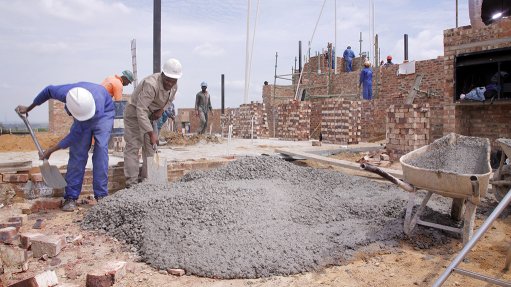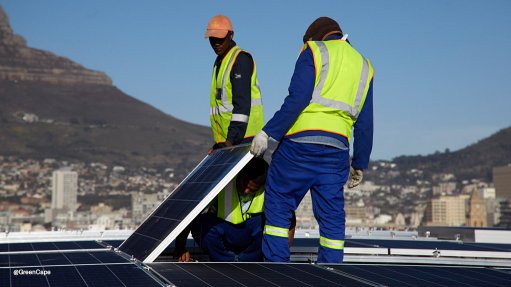Project to boost company profits

ISLAND VIEW TERMINAL Fabricon has about 100 people working on Island View terminal
Photo by Fabricon
ENSURING SUFFICIENT SKILLS Fabricon bought Kim’s Welding School, as it recognised the importance of having a sufficient supply of skilled welders
Photo by Fabricon
Engineering and labour broking services provider Fabricon Pipe & Labour Hire has quadrupled its turnover this year, owing to the company’s work on several public and private petrochemicals and industrial projects.
Fabricon MD Selwin Swartz tells Engineering News that the company is currently achieving a R70-million turnover, compared with R14-million in 2013.
Additionally, he notes that Fabricon received an award last month from social innovation centre Impumelelo for its efforts in promoting transformation and empowering underprivileged South Africans through job creation and training initiatives.
“We are currently working on the construction of a terminal for the new multiproduct pipeline (NMPP) for State-owned freight logistics group Transnet’s subsidiary Transnet Pipelines, which will transport petrol, diesel and jet fuel from the Port of Durban, in KwaZulu-Natal, to Gauteng,” he states.
The R23.4-billion NMPP network will comprise a 160 km 16-inch-diameter inland pipeline network, incorporating links from Kendal to Waltloo, Alrode to Langlaagte and from Jameson Park to Alrode; and a 555 km 24-inch-diameter trunk-line from Island View, Durban, to Jameson Park, Gauteng.
The network is expected to have a capacity of 1 000 m3/h when brought on stream, which could be scaled up to 3 000 m3/h through the addition of new pumpstations.
The new pipeline is designed to have a life cycle spanning more than 70 years.
The project also entails the upgrading of the Island View station at the Port of Durban, as well as the construction of part of the Island View petrochemicals terminal.
Work on the Island View terminal started in March 2013, with construction completed on over 80% of the terminal.
“We are on schedule to complete our work by the end of this year,” says Swartz, adding that the project involves a mix of tungsten inert gas and shielded arc welding, commonly used in petrochemicals piping applications.
He explains that Fabricon is responsible for the construction of about 14 km of piping within the terminal and for the piping fabrication and erection of the terminal.
“The main challenge relating to the Island View terminal has been ensuring that work is completed within the tight schedule that Transnet and primary contractor JSE-listed construction company Group Five have given us,” says Swartz.
He points out that the company has been able to remain on schedule and within budget with about 100 people working on the project.
Further, he stresses that, as there is no room for error in petrochemicals projects, the company strictly enforces the American Society of Mechanical Engineers standards on all its operations.
“The welds must be able to withstand high thermal pressures and stresses, such as tensile stresses, which occur on petrochemicals pipelines,” Swartz emphasises.
Vopak Project
The company is close to completing the R35-million Fuel 2 project for Dutch independent tank storage provider Vopak in the Island View area.
Fabricon has about 60 workers working on the Fuel 2 project.
“The project involves the rerouting of about 6 km of stainless steel pipelines at the company’s fuel plants, so as to enable Vopak to expand the plant,” says Swartz, who adds that Fabricon has been working on the project since July 2013.
He says the Fuel 2 project required a high level of skills sets, owing to the fact that stainless steel is a material that cannot be reworked once it is incorrectly welded, and is “a highly reactive material that requires a higher level of input compared to carbon steels”.
Additionally, Swartz highlights that stainless steel piping requires a consistent flow of inert gas within the pipeline during the welding process, which makes it more challenging for welders, owing to safety concerns relating to the flammable nature of the gases.
Tarlton Project
Further, Swartz adds that Fabricon was also responsible for undertaking the civil and mechanical works on Transnet’s R16.6-million Tarlton additive dosing plant, in Krugerdorp, on the West Rand, which it completed in April.
The civil works for the new Tarlton additive dosing plant comprised the construction of a new bund floor slab lined with a 1.5 mm high-density polyethylene liner with bund walls and the construction of 12 tank bases.
The additive dosing plant required 12 pump plinths, including cable draw boxes and pipe sleepers to house the mechanical piping plant.
Further, the mechanical works for the plant included the fabrication and installation of a steel structure, along with roofing to house the plant.
Additionally, Fabricon was responsible for the fabrication and installation of the structural steel pipe bridges and supports.
“We also installed tanks and pumps and fabricated and installed the stainless steel piping process system, which feeds into the new tanks, pumps and existing plant,” notes Swartz.
He adds that the company also fabricated and installed the plant’s fire protection system, including the sprinkler system and showers.
Welding Training
Fabricon bought welding training company Kim’s Welding School, which is located in the Durban South region, in January 2010, as it recognised the importance of having its own feeder academy to ensure it had a sufficient supply of skilled welders at its disposal, owing to the lack of skilled welders in the country.
“Kim’s Welding School is accredited by the Manufacturing, Engineering and Related Services Sector Education and Training Authority,” Swartz points out, adding that the school is not exclusively for Fabricon’s employees as it is open to all individuals and companies seeking to learn the skill of welding.
“Several companies, including industrial gas company Afrox, send their employees for training programmes at our school,” he states.
Swartz explains that Fabricon provides bursaries to the value of about R600 000 for 30 students to study at the school each year.
He says that these bursaries form part of the company’s social responsibility and training commitment to the local community.
“Anyone in the Durban South area, including school leavers, technicon graduates and ordinary unemployed people, can apply for these bursaries.”
Swartz explains that all bursary candidates are interviewed and the major bursary criterion is whether they are disadvantaged – which he stresses goes beyond race and gender, and focuses specifically on the person’s background, such as whether the applicant is a single parent or someone who grew up with no parents – and whether the applicant is genuinely interested in completing the training programmes and working in the industry.
The school also enrolls on average about 70 privately funded students in addition to the 30 Fabricon funded students.
Kim’s Welding School offers a range of courses, including gas tungsten arc welding, shielded metal arc welding, metal inert gas welding, flux cored arc welding, oxy-acetylene welding and brazing, as well as aluminium welding.
The school will also soon be introducing new courses, such as construction quality control inspector field equipping, safety officer field equipping, pipe fabrication, boilermaking and a number soft skill courses.
“The introduction of the new courses is the result of Fabricon identifying the need to ensure people are field ready and not just qualified people with no relevant work experience. Therefore, these new courses will ensure that graduates will be more employable after completing them,” Swartz concludes.
Comments
Press Office
Announcements
What's On
Subscribe to improve your user experience...
Option 1 (equivalent of R125 a month):
Receive a weekly copy of Creamer Media's Engineering News & Mining Weekly magazine
(print copy for those in South Africa and e-magazine for those outside of South Africa)
Receive daily email newsletters
Access to full search results
Access archive of magazine back copies
Access to Projects in Progress
Access to ONE Research Report of your choice in PDF format
Option 2 (equivalent of R375 a month):
All benefits from Option 1
PLUS
Access to Creamer Media's Research Channel Africa for ALL Research Reports, in PDF format, on various industrial and mining sectors
including Electricity; Water; Energy Transition; Hydrogen; Roads, Rail and Ports; Coal; Gold; Platinum; Battery Metals; etc.
Already a subscriber?
Forgotten your password?
Receive weekly copy of Creamer Media's Engineering News & Mining Weekly magazine (print copy for those in South Africa and e-magazine for those outside of South Africa)
➕
Recieve daily email newsletters
➕
Access to full search results
➕
Access archive of magazine back copies
➕
Access to Projects in Progress
➕
Access to ONE Research Report of your choice in PDF format
RESEARCH CHANNEL AFRICA
R4500 (equivalent of R375 a month)
SUBSCRIBEAll benefits from Option 1
➕
Access to Creamer Media's Research Channel Africa for ALL Research Reports on various industrial and mining sectors, in PDF format, including on:
Electricity
➕
Water
➕
Energy Transition
➕
Hydrogen
➕
Roads, Rail and Ports
➕
Coal
➕
Gold
➕
Platinum
➕
Battery Metals
➕
etc.
Receive all benefits from Option 1 or Option 2 delivered to numerous people at your company
➕
Multiple User names and Passwords for simultaneous log-ins
➕
Intranet integration access to all in your organisation


















